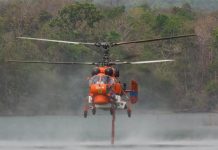SEJONG, Jan 29 – South Korea will review some 300 rules governing maritime safety from scratch this year to make it safer for people to travel on ships, the government said Thursday.
The policy goal set by the Ministry of Oceans and Fisheries comes after 295 people, mostly high school students, died in the Sewol ferry sinking in April last year. Nine are still missing. The sinking of the 6,825-ton ferry is one of the deadliest maritime disasters in the country’s history, and it triggered widespread calls for an overhaul of the country’s maritime safety regulations.
Those implicated in the tragedy have been arrested and are on trial, with state prosecutors claiming a combination of ship cargo overloading, poor steering and remodeling of the vessel as the cause of the disaster.
Criticism of the government’s poor initial response and confusion led to the dismantlement of the Coast Guard.
The ministry said that 800 million won (US$742,000) will be used next month to conduct detailed evaluations on the main sea routes around the country, with another 4 billion won to be spent on establishing new safe operational guidelines around the major ports of Ulsan, Gwangyang and Incheon that are used frequently by oil tankers and other large ships.
The Sewol ferry had left from Incheon on its ill-fated voyage, with port authorities being blamed for failing to check whether the ship was overloaded.
In addition, the maritime ministry said it will follow through on reform measures announced in September that call for the government to directly regulate safety, increase the amount of fines for rule violations from 30 million won to 1 billion won, and reduce the age of vessels that can be used as car ferries from 30 to 25 years.
All crew members will be obliged to wear uniforms, and barriers restricting companies from entering the shipping line business will be lifted in June.
To ensure that companies make a profit, which is critical for upgrading safety rules and crew training, the government will allow fuel surcharges and flexible fare rates for weekend operations.
In addition, the ministry said it will take steps to reduce the number of accidents involving fishing boats, which made up 76.7 percent of all maritime accidents in the past five years.
These steps include automatic location tracking systems, compelling crew members to wear life jackets and implementing mandatory safety instruction for people on fishing boats.
On the peaceful use of waters surrounding the Korean Peninsula, systematic measures will be taken to better manage the country’s exclusive economic zone (EEZ) and its continental shelf regions, the ministry said.




